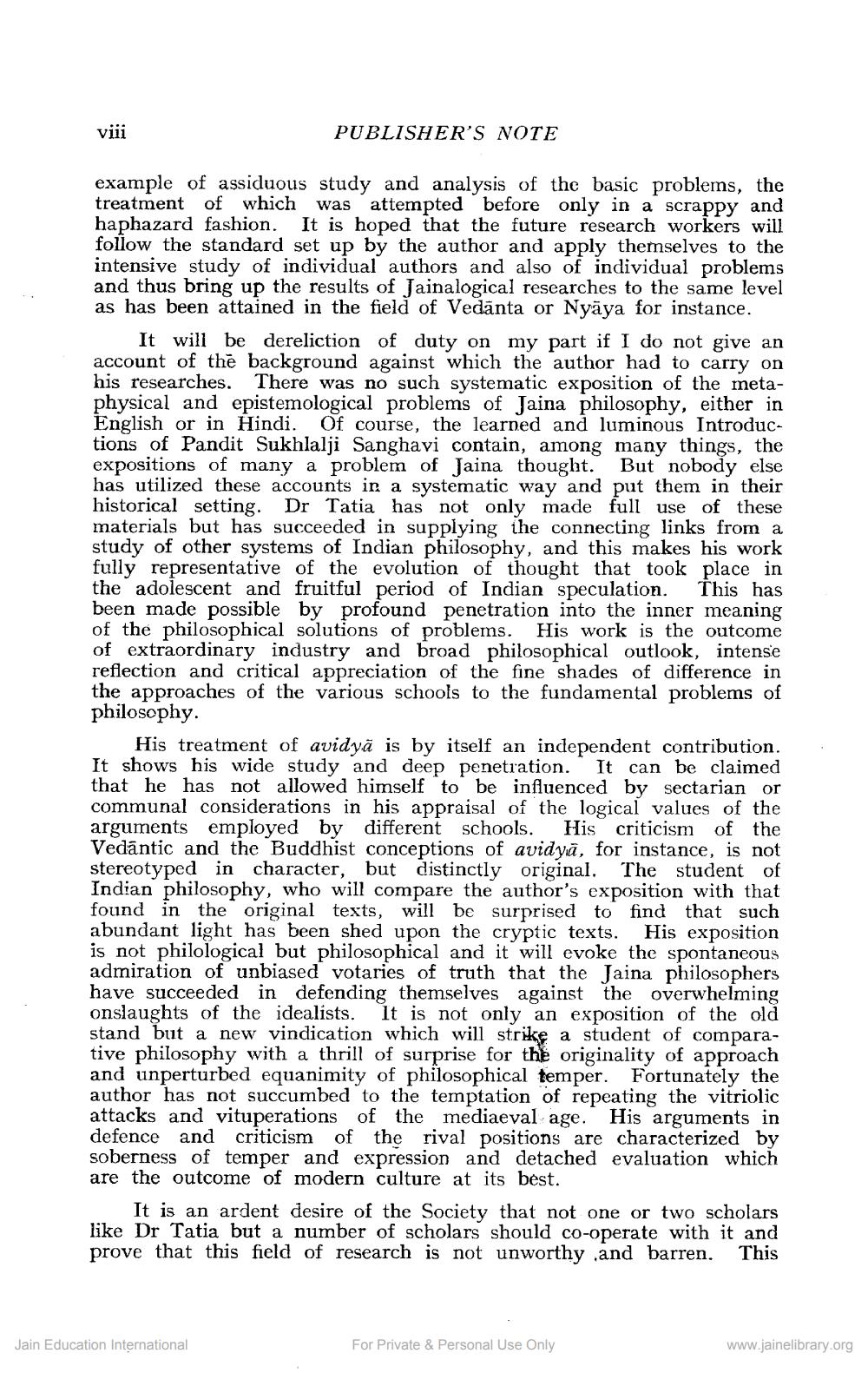Book Title: Studies in Jaina Philosophy Author(s): Nathmal Tatia Publisher: Jain Cultural Research Society View full book textPage 9
________________ viii PUBLISHER'S NOTE example of assiduous study and analysis of the basic problems, the treatment of which was attempted before only in a scrappy and haphazard fashion. It is hoped that the future research workers will follow the standard set up by the author and apply themselves to the intensive study of individual authors and also of individual problems and thus bring up the results of Jainalogical researches to the same level as has been attained in the field of Vedanta or Nyaya for instance. It will be dereliction of duty on my part if I do not give an account of the background against which the author had to carry on his researches. There was no such systematic exposition of the metaphysical and epistemological problems of Jaina philosophy, either in English or in Hindi. Of course, the learned and luminous Introductions of Pandit Sukhlalji Sanghavi contain, among many things, the expositions of many a problem of Jaina thought. But nobody else has utilized these accounts in a systematic way and put them in their historical setting. Dr Tatia has not only made full use of these materials but has succeeded in supplying the connecting links from a study of other systems of Indian philosophy, and this makes his work fully representative of the evolution of thought that took place in the adolescent and fruitful period of Indian speculation. This has been made possible by profound penetration into the inner meaning of the philosophical solutions of problems. His work is the outcome of extraordinary industry and broad philosophical outlook, intense reflection and critical appreciation of the fine shades of difference in the approaches of the various schools to the fundamental problems of philosophy. His treatment of avidya is by itself an independent contribution. It shows his wide study and deep penetration. It can be claimed that he has not allowed himself to be influenced by sectarian or communal considerations in his appraisal of the logical values of the arguments employed by different schools. His criticism of the Vedantic and the Buddhist conceptions of avidya, for instance, is not stereotyped in character, but distinctly original. The student of Indian philosophy, who will compare the author's exposition with that found in the original texts, will be surprised to find that such abundant light has been shed upon the cryptic texts. His exposition is not philological but philosophical and it will evoke the spontaneous admiration of unbiased votaries of truth that the Jaina philosophers have succeeded in defending themselves against the overwhelming onslaughts of the idealists. It is not only an exposition of the old stand but a new vindication which will strike a student of comparative philosophy with a thrill of surprise for the originality of approach and unperturbed equanimity of philosophical temper. Fortunately the author has not succumbed to the temptation of repeating the vitriolic attacks and vituperations of the mediaeval age. His arguments in defence and criticism of the rival positions are characterized by soberness of temper and expression and detached evaluation which are the outcome of modern culture at its best. It is an ardent desire of the Society that not one or two scholars like Dr Tatia but a number of scholars should co-operate with it and prove that this field of research is not unworthy and barren. This Jain Education International For Private & Personal Use Only www.jainelibrary.orgPage Navigation
1 ... 7 8 9 10 11 12 13 14 15 16 17 18 19 20 21 22 23 24 25 26 27 28 29 30 31 32 33 34 35 36 37 38 39 40 41 42 43 44 45 46 47 48 49 50 51 52 53 54 55 56 57 58 59 60 61 62 63 64 65 66 67 68 69 70 71 72 73 74 75 76 77 78 79 80 81 82 83 84 85 86 87 88 89 90 91 92 ... 366
